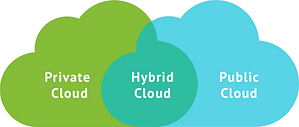HYBRID CLOUD
HYBRID CLOUD
Hybrid cloud is a cloud computing environment that is built on two or more components from public cloud, private cloud and on-premises IT. It connects a company’s on-premises private cloud services and third-party public cloud into a single, flexible infrastructure for running the organization’s applications and workloads.
By mixing public cloud and private cloud resources it gives an organisation the flexibility to choose the optimal cloud for each application which enables the organization to meet its business and technical more effectively and cost efficient than it could with public or private cloud alone.
Depending on the need and the goal of organisation every hybrid cloud environment is different. A hybrid cloud is typically a mixture of a private (on premise) cloud and a public (off premise) cloud which incorporates workload portability, orchestration and management of two or more computing environments. It offers numerous benefits to advantage and benefits to enterprise organisation
A hybrid cloud gives flexibility to support the remote and distributed employees with access to on demand that isn’t tied up to one central location. They can move any sensitive data to their private on premise server while making application and services available on public cloud
In order to migrate to cloud cost is the key factor of many organisation. For companies that want more security and control for their data but need a cost-effective way to run their operation and business, hybrid cloud would be a good solution over it.
Businesses have greater control over data in hybrid cloud environment as it needs to evolve and demand for IT services so that organisations can scale their workload accordingly. You can also adjust your cloud settings to respond automatically to changes that are in demand which optimizes performance and efficiency.

Based on compliance, policy or security requirements enterprise can choose where to house their data. The security team can standardize redundant cloud storage in cloud environment, which is an important aspect of disaster recovery and data insurance.
Centralized management of hybrid cloud also makes it easier to implement strong technical security measures such as encryption, access control, automation, orchestration, and endpoint security so you can manage risk effectively.



